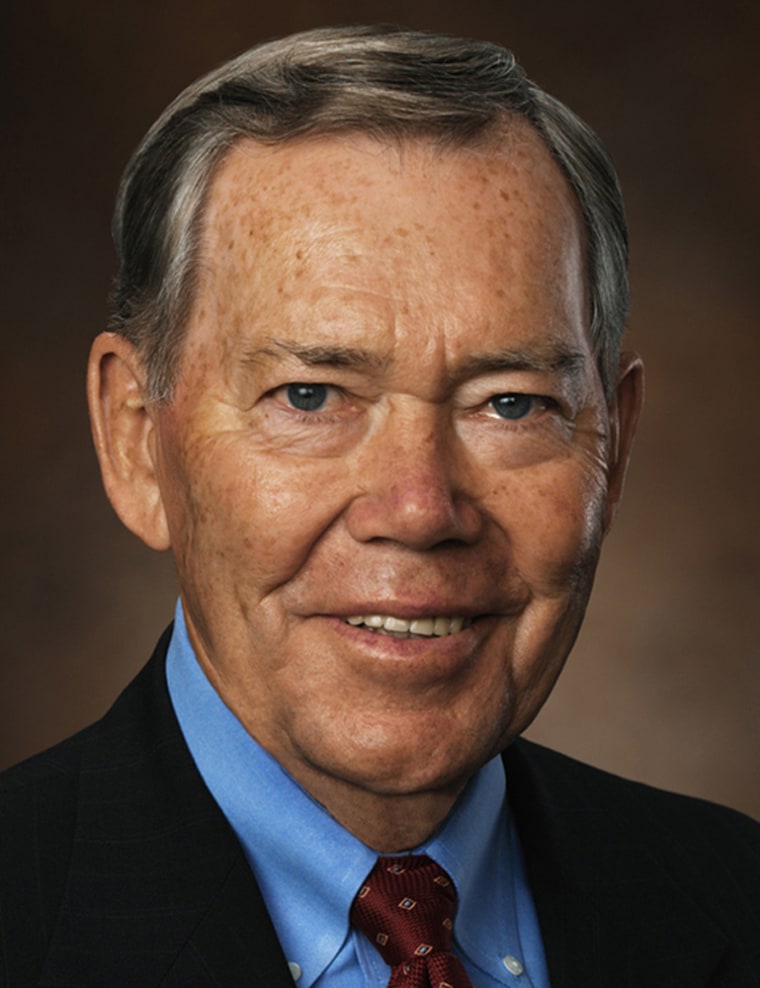Wyoming Sen. Craig Thomas, a three-term conservative Republican who stayed clear of the Washington limelight and political catfights, died Monday. He was 74.
The senator’s family issued a statement saying he died Monday evening at National Naval Medical Center in Bethesda, Md. He had been receiving chemotherapy for acute myeloid leukemia.
Just before the 2006 election, Thomas was hospitalized with pneumonia and had to cancel his last campaign stops. He nonetheless won with 70 percent of the vote, monitoring the election from his hospital bed.
Two days after the election, Thomas announced that he had just been diagnosed with leukemia.
Gov. Dave Freudenthal, a Democrat, will appoint a successor from one of three finalists chosen by the state Republican party.
“Wyoming had no greater advocate, taxpayers had no greater watchdog, and rural America had no greater defender than Craig Thomas,” Senate Republican Leader Mitch McConnell said Monday night. “The Senate is a lesser place without Craig here, but the state of Wyoming and our nation are much better places because he was here.”
Thomas was a low-key lawmaker who reliably represented the interests of his conservative state, often becoming involved in public lands issues. He worked in behind-the-scenes posts to oversee national parks, including Yellowstone in Wyoming.
He was also an advocate for domestic energy and minerals production. He worked to protect Wyoming’s mining industry from foreign competition and backed efforts to get a federally funded coal gasification plant built in the state.
‘A fierce advocate for Wyoming’
Wyoming’s other senator, Republican Mike Enzi, said Monday evening that he was “so stunned.”
“The Senate will not be the same,” he said. “Craig was the core of our delegation. He was a fierce advocate for Wyoming. ... He was my senior senator, a confidant, mentor and friend. ... I will miss him.”
Gov. Freudenthal said he and his wife have known Thomas for many decades and his death “is a very big loss to the people of this state.”
“He carried the values that we treasure in Wyoming to Washington and had many successes,” Freudenthal said.
After his first round of chemotherapy, Thomas returned to the Senate in December, a month earlier than expected. A few months later, he said he felt better than he had in a long time. But he returned to the hospital for a second round of chemotherapy in May.
“I’m resolved to do all I can to keep the leukemia in check,” he said then. “I’ve been feeling very good over the last several months — even returning to my regular morning run. But I’ve always known that further treatments are common and could periodically be part of this thing.”
Special election in 1989
Thomas entered Congress in a special election in 1989 to replace Dick Cheney when the future vice president was named defense secretary by the first President Bush. Thomas won that race with 52 percent of the vote.
In 1994, Thomas won his first Senate race by beating former Gov. Mike Sullivan 59 percent to 39 percent. Thomas was re-elected by a wide margin in 2000, winning 74 percent of the vote against Democrat Mel Logan and Libertarian Margaret Dawson.
Thomas had previously served five years in the Wyoming Legislature.
He was born in Cody, Wyo., and was raised on a ranch. He graduated from the University of Wyoming with a degree in agriculture, then served four years in the U.S. Marines.
He also was vice president of the Wyoming Farm Bureau and general manager of the Wyoming Rural Electric Association.
He is survived by his wife, Susan, and four children.
According to Peggy Nighswonger, Wyoming’s elections director, the governor has five days to appoint one of the party’s three nominees once he receives the names. That person will serve until the next general election in 2008.
